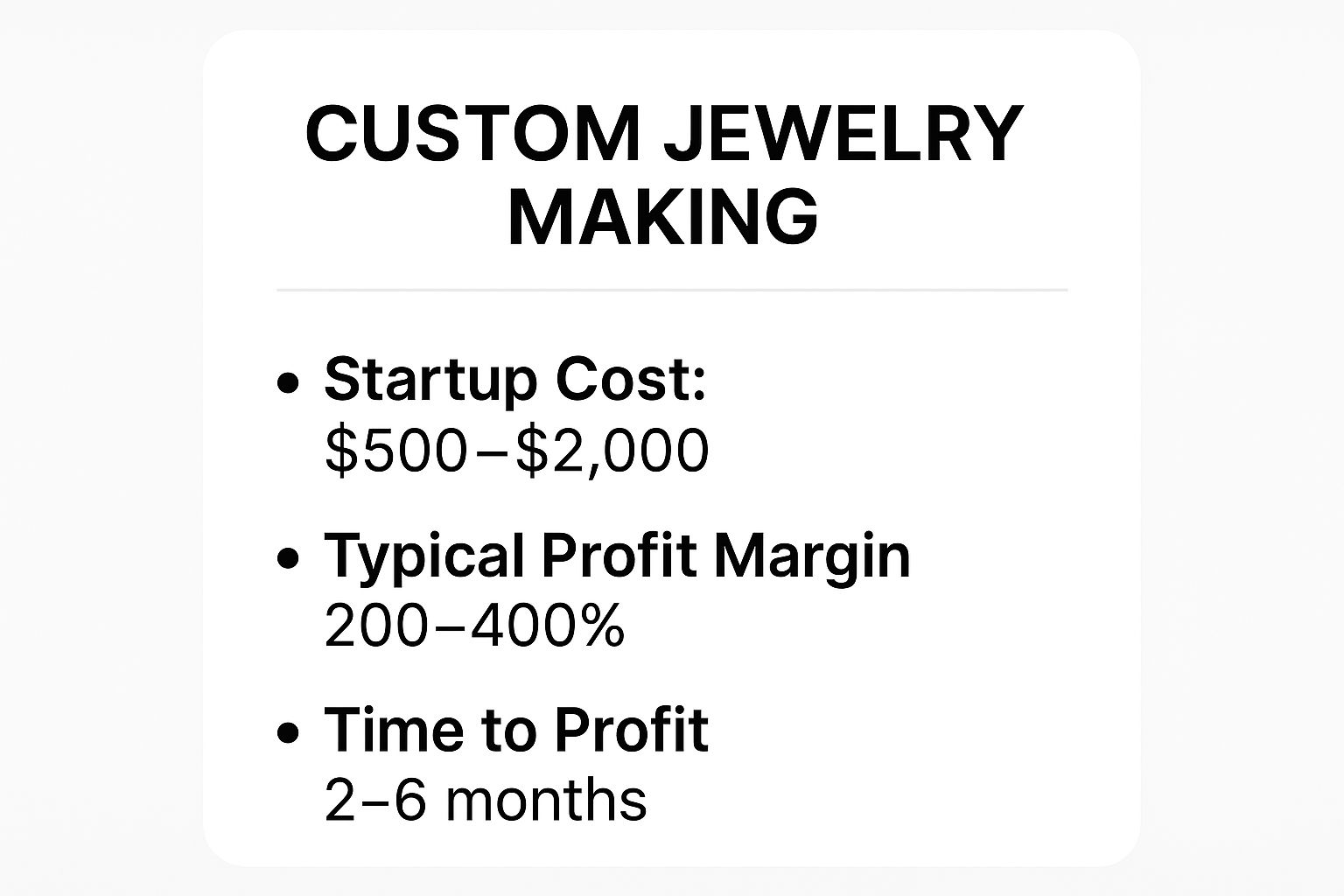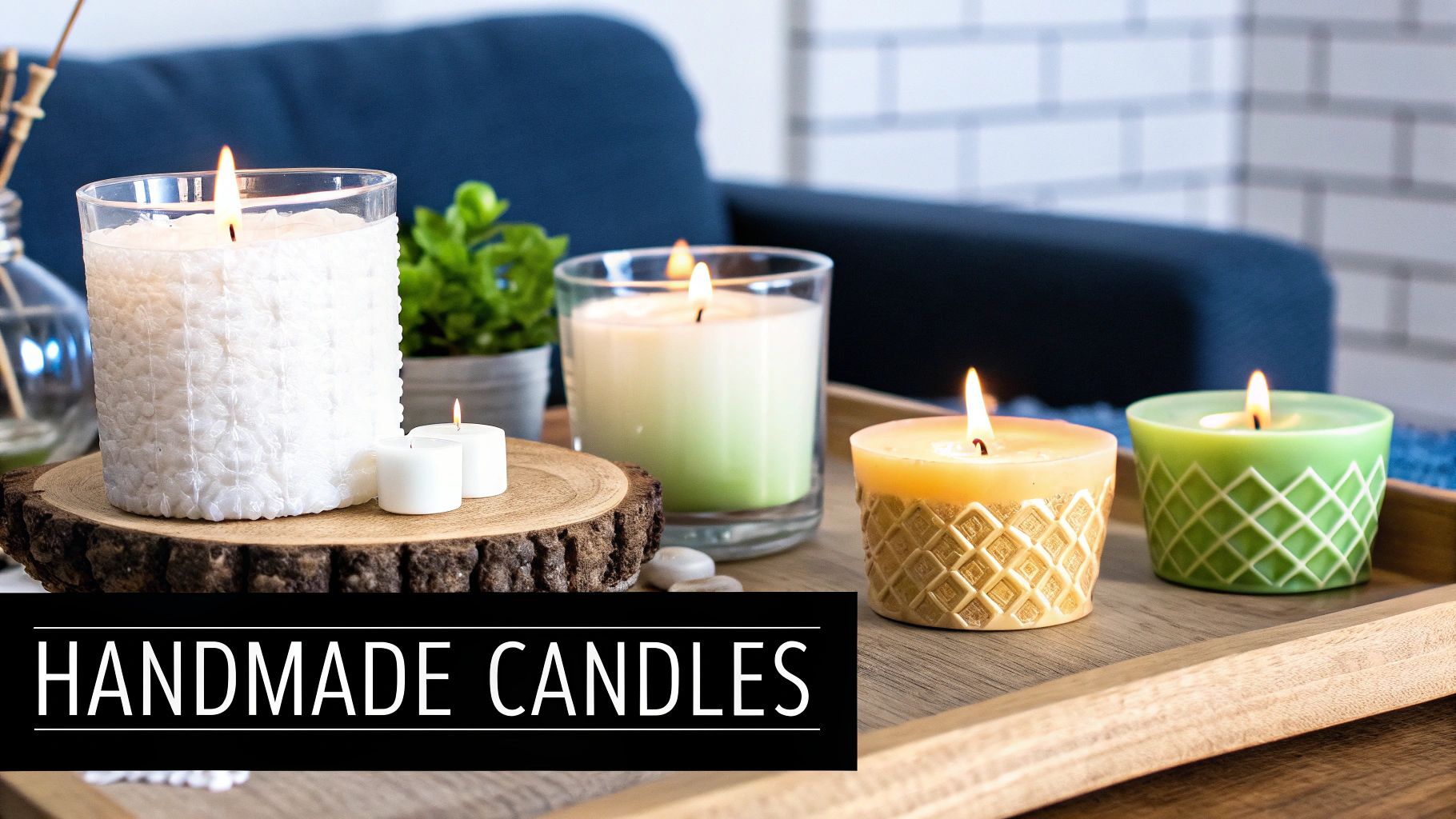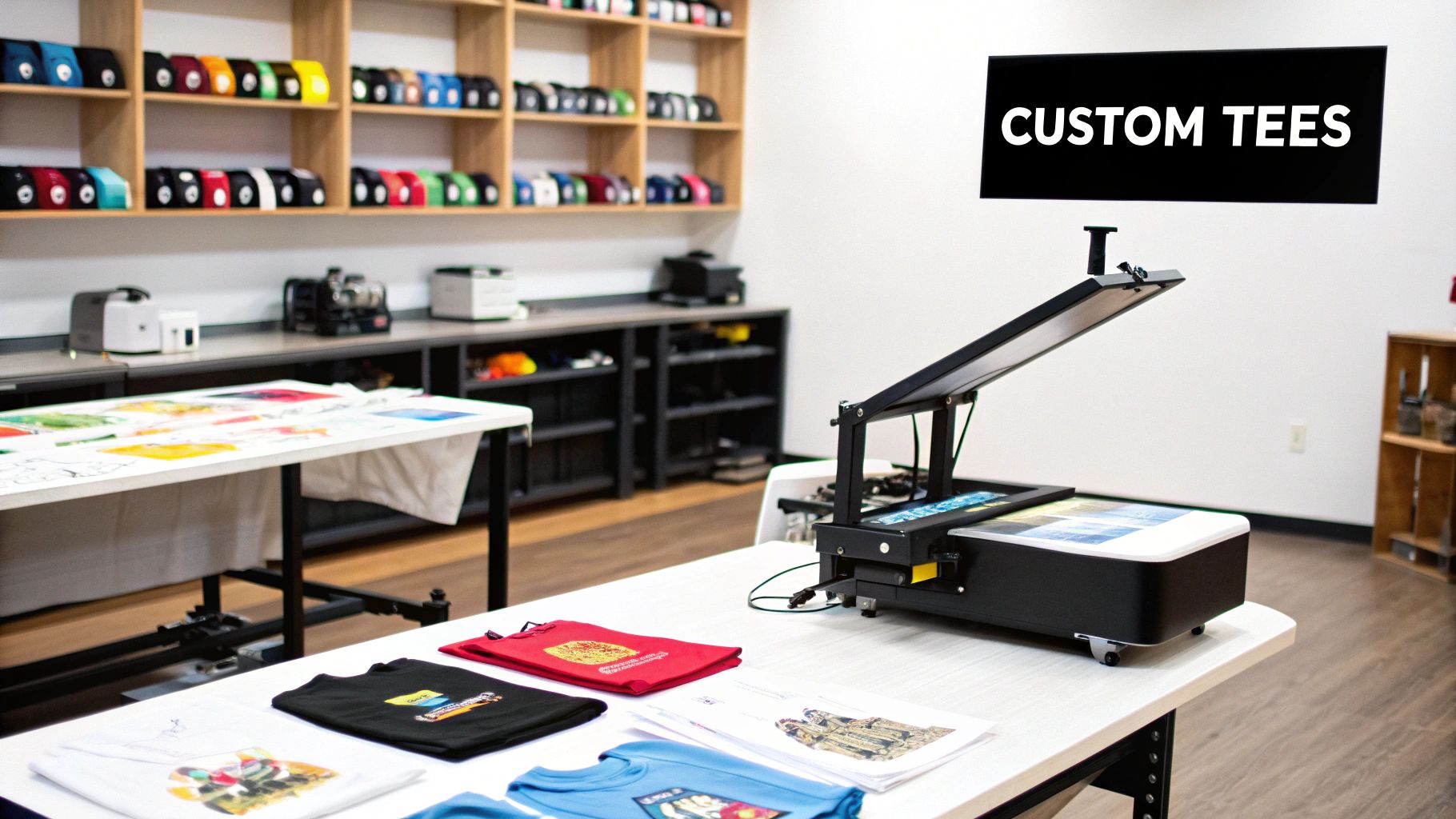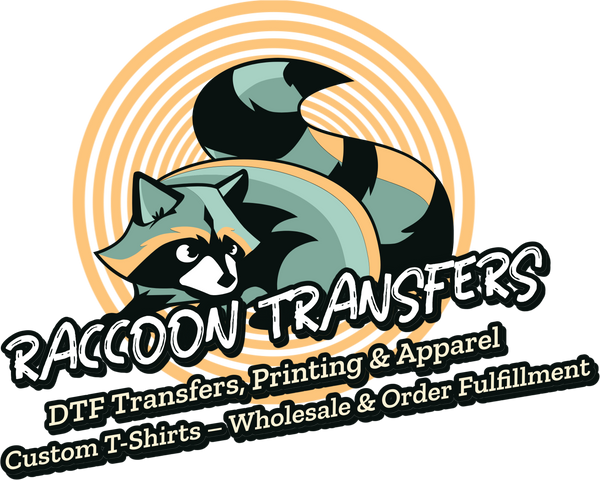
8 Profitable Small Business Craft Ideas for 2025
Share
The creator economy is booming, and there has never been a better time to launch a business based on your artistic talents. But with so many options available, which crafts offer the best return on your time and investment? This guide cuts through the noise to provide a detailed roadmap for some of the most profitable small business craft ideas for aspiring entrepreneurs. We move beyond simple suggestions to dive deep into what it takes to succeed, covering everything from startup costs and profit potential to effective branding strategies and actionable tips for each venture.
This curated list is designed to provide clarity and actionable insights for turning a creative passion into a viable enterprise. Whether you're an experienced crafter looking to scale or a hobbyist ready to take the first step, this roundup will equip you with the practical knowledge needed to build a thriving handmade business from the ground up. We will explore the specifics of custom jewelry, handmade candles, apparel printing, and much more. You will learn not just what to make, but how to transform your creations into a successful brand. Let's get started.
1. Custom Jewelry Making
Custom jewelry making stands out as one of the most profitable and versatile small business craft ideas for entrepreneurs. This craft involves designing and creating unique pieces like earrings, necklaces, and bracelets using materials ranging from affordable beads and wire to semi-precious stones and sterling silver. The appeal lies in its high potential for personalization, allowing you to cater to diverse customer tastes, occasions, and price points.
From Etsy sellers earning significant annual incomes to local artisans thriving at craft fairs, the success stories are numerous. Powerhouses like Kendra Scott famously started her brand from a spare bedroom, proving that a small-scale operation can grow into a global empire with the right vision and product. The key is finding a specific niche to stand out in a crowded market.
Actionable Strategies for Success
To turn this craft into a viable business, focus on a targeted approach. Instead of trying to please everyone, specialize in a particular style or market segment.
- Define Your Niche: Concentrate on a specific area like minimalist everyday wear, bold statement pieces, bridal jewelry, or personalized men's accessories. This focus helps define your brand identity and attract a loyal customer base.
- Invest in Quality Presentation: High-quality photography is non-negotiable for online sales. Your product photos must accurately represent the color, size, and detail of your work. Similarly, invest in professional and secure packaging to elevate the customer experience.
- Build Local Partnerships: Connect with local boutiques, salons, or wedding planners to carry your products. These collaborations can provide a steady stream of revenue and increase your brand's visibility within the community.
The following summary box provides a quick reference for the financial potential of launching a custom jewelry business.

As the data shows, the low startup cost and high profit margins make jewelry making an accessible and financially rewarding venture, with a relatively quick path to profitability.
2. Handmade Candles and Wax Melts
Handmade candles and wax melts represent a booming segment within the home fragrance market, making them excellent small business craft ideas. This craft involves melting waxes like soy, beeswax, or paraffin, infusing them with custom fragrance oils, and pouring them into various containers or molds. The appeal is driven by consumer demand for natural, handmade products that add ambiance and personality to their living spaces.

The potential for growth is significant, as demonstrated by giants like Yankee Candle, which famously began when founder Mike Kittredge created a candle from melted crayons in his family's kitchen. Today, countless Etsy sellers and local market vendors build thriving businesses by offering unique, high-quality scented products. Success hinges on creating distinct scent profiles and a strong brand identity that resonates with a target audience.
Actionable Strategies for Success
To transform this craft into a profitable venture, a focus on quality, safety, and branding is essential. Your product's performance and presentation will set you apart from mass-market alternatives.
- Develop Unique Scent Profiles: Don't just stick to common scents like vanilla or lavender. Experiment by blending fragrance oils to create signature aromas that are unique to your brand, such as "Coastal Bonfire" or "Morning Bookstore."
- Prioritize Safety and Testing: Thoroughly test every candle batch for proper burn time, wick performance, and scent throw. Include clear warning labels and burning instructions with every product to ensure customer safety and build trust.
- Create Seasonal and Themed Collections: Capitalize on holidays and seasons by launching limited-edition collections. This strategy creates urgency, encourages repeat purchases, and keeps your product line fresh and exciting for loyal customers.
3. Custom T-Shirt and Apparel Printing
Custom T-shirt and apparel printing is a dynamic and in-demand choice among the best small business craft ideas. This business involves creating personalized clothing using methods like heat transfer vinyl (HTV), screen printing, or sublimation to apply designs onto shirts, hoodies, and other garments. The market is vast, serving everyone from individuals seeking one-of-a-kind gifts to businesses, schools, and local organizations needing branded apparel for events and uniforms.

The potential for growth in this sector is well-documented. Major companies like CustomInk famously started small and grew into nine-figure enterprises, while platforms like Printful and Printify empower thousands of entrepreneurs to run print-on-demand businesses from home. At a local level, small print shops are community staples, proving that success is achievable at any scale with the right strategy and a commitment to quality.
Actionable Strategies for Success
To build a profitable apparel printing business, you must differentiate yourself through specialization and superior service. This approach will help you capture a loyal segment of the market rather than competing solely on price.
- Start with a Low-Cost Method: Begin with a heat transfer vinyl (HTV) setup using a cutting machine like a Cricut or Silhouette and a heat press. This method has a low initial investment and is perfect for creating custom, one-off designs. For those interested in this technique, you can learn more about how to get started with heat transfer paper on raccoontransfers.com.
- Focus on a Specific Niche: Target a specific market, such as local sports teams, small businesses, bachelorette parties, or hobbyist groups like car clubs or book clubs. A niche focus makes your marketing more effective and establishes you as the go-to expert.
- Build Local B2B Relationships: Proactively connect with local businesses, event planners, and schools. Offering bulk discounts and reliable service for their uniform or event needs can create a consistent and lucrative revenue stream for your operation.
4. Handmade Soap and Bath Products
Crafting handmade soaps and bath products has emerged as a particularly rewarding venture among small business craft ideas. This field involves creating items like artisanal bar soaps, fizzy bath bombs, exfoliating body scrubs, and soothing lotions. Entrepreneurs can use methods ranging from the beginner-friendly melt-and-pour technique to the more advanced cold or hot process soap making. The market for these goods is driven by a strong consumer desire for natural, chemical-free, and ethically sourced personal care items.
The potential for growth is significant. Global brands like Lush began as a small UK soap company, demonstrating how a commitment to fresh, handmade cosmetics can resonate with a massive audience. On a smaller scale, countless Etsy sellers and farmers market vendors have built thriving businesses by cultivating a loyal local following. The success of these ventures often hinges on creating a unique sensory experience through distinct scents, textures, and visual appeal.
Actionable Strategies for Success
To transform your soap-making hobby into a profitable business, a strategic focus on branding, safety, and customer retention is essential. Your approach should differentiate your products in a growing marketplace.
- Master the Basics Safely: Begin with the melt-and-pour method to understand scent blending, colorants, and molding without handling lye. Before advancing to cold process soap making, thoroughly research safety protocols for handling caustic materials.
- Comply with Regulations: Research and adhere to FDA regulations regarding cosmetic labeling. Properly listing ingredients and avoiding unsubstantiated medical claims is crucial for building trust and operating legally.
- Develop a Signature Line: Create a cohesive product line centered around a unique theme. This could be local ingredients like lavender or honey, a specific skin benefit like "calming" or "energizing," or a novel aesthetic that makes your products instantly recognizable and highly giftable. Excellent packaging is key to elevating your brand's perceived value.
5. Personalized Wooden Signs and Home Décor
Creating custom wooden signs and décor is one of the most heartwarming small business craft ideas, tapping into the powerful trend of personalized living spaces. This craft involves transforming wood into bespoke signs, wall art, and decorative items using techniques like hand painting, wood burning, laser engraving, or CNC routing. The appeal is rooted in its ability to offer unique, meaningful products that commemorate life events, celebrate family, and enhance home aesthetics.
The potential for this craft is evident in diverse success stories. Businesses like Rustica Hardware have scaled from simple custom signs into multi-million dollar enterprises. On a smaller scale, many local woodworkers consistently earn six-figure incomes at craft fairs and online, specializing in everything from rustic farmhouse décor to sleek, modern designs for wedding venues. This proves that a passion for woodworking can be cultivated into a highly profitable venture.
Actionable Strategies for Success
To transform this craft into a thriving business, you must blend artistic skill with smart production and marketing. Specializing in a particular style or occasion can help you stand out.
- Invest in Efficient Tools: While hand-painting has its charm, investing in a quality CNC router or laser engraver can drastically increase your production speed and design precision. This allows you to scale your business and take on larger or more complex orders.
- Develop Popular Templates: Create a portfolio of templates for popular quotes, family name designs, and common occasions like weddings or new babies. This streamlines the customization process for customers and makes your workflow more efficient.
- Forge B2B Partnerships: Connect with real estate agents, wedding planners, and event coordinators who need custom signage for clients or venues. These partnerships can provide a consistent source of bulk orders and introduce your brand to new audiences.
6. Handmade Pottery and Ceramics
Handmade pottery and ceramics represent one of the most enduring and respected small business craft ideas, connecting an ancient art form with modern consumer demand for unique, artisan goods. This craft involves shaping clay into functional or decorative items like mugs, bowls, and vases, which are then fired in a kiln and glazed. The appeal lies in creating tangible, one-of-a-kind pieces that bring artistry into everyday life, commanding higher price points than mass-produced alternatives.
The success of this craft is evident across various scales. Artisanal brands like Heath Ceramics have built a legacy on high-quality, handcrafted dinnerware, while countless individual potters on Etsy generate five-figure incomes selling their unique creations. The recent surge in popularity, fueled by social media and shows like The Great British Pottery Throw Down, has created a robust market for those who can develop a distinct style.
Actionable Strategies for Success
To transform pottery from a hobby into a profitable venture, a strategic approach is essential. Differentiating your work is key to capturing customer attention and building a sustainable business.
- Start with Hand-Building: Before investing in an expensive pottery wheel and kiln, master hand-building techniques like pinching, coiling, and slab building. This lowers initial startup costs and helps you develop a feel for the medium while creating sellable products like decorative trays or planters.
- Focus on Functional Art: While sculptural pieces can be beautiful, functional items like coffee mugs, serving bowls, and utensil holders have broader market appeal. These pieces are easier to sell consistently as they serve a practical purpose in a customer's home.
- Develop a Signature Style: Create a unique identity for your brand through distinctive glazes, forms, or surface textures. A recognizable aesthetic helps you stand out and encourages repeat purchases from customers who connect with your specific artistic vision.
- Offer Workshops and Classes: Once established, teaching pottery classes can become a significant secondary revenue stream. It not only generates income but also builds a local community around your brand and positions you as an expert in your field.
7. Handmade Greeting Cards and Stationery
Handmade greeting cards and stationery have emerged as highly personal and profitable small business craft ideas in a digitally dominated world. This craft involves creating unique cards, invitations, and note sets using techniques like calligraphy, watercolor, stamping, and embossing. The appeal is rooted in the tangible, personal touch that mass-produced items lack, making them perfect for special occasions and heartfelt messages.
The potential for this craft is immense, with countless success stories validating its viability. Industry giant Hallmark, for instance, famously began when Joyce Clyde Hall started selling postcards from a small Kansas City shop. On a smaller scale, Etsy is filled with sellers who have built thriving businesses creating custom wedding invitation suites, and local calligraphers often command premium prices for their bespoke services at community markets.
Actionable Strategies for Success
To succeed in this field, you must differentiate your work by focusing on a specific aesthetic or occasion, turning your paper goods into must-have items for a target audience.
- Specialize in a Niche Occasion: Rather than creating generic cards, focus on a specific market like luxury wedding invitations, quirky birthday cards, or elegant baby shower announcements. This specialization helps build a recognizable brand and attracts customers looking for something specific.
- Offer Bundled Sets and Suites: Increase your average order value by creating coordinated product bundles. Offer thank you card sets, matching gift tags, or complete wedding stationery suites that include everything from save-the-dates to menus. This provides a comprehensive solution for customers.
- Forge Partnerships with Event Planners: Collaborate with local wedding planners, event coordinators, and corporate gift suppliers. These professionals are constantly in need of high-quality, custom stationery and can become a reliable source of recurring, high-volume orders for your business.
8. Custom Leather Goods
Creating custom leather goods is a highly respected and enduring choice among small business craft ideas, celebrated for its blend of artistry and durability. This craft involves using traditional techniques like cutting, tooling, stitching, and finishing to produce high-end items such as wallets, belts, bags, and keychains. The appeal of leather lies in its timeless quality and the ability to create long-lasting products that gain character with age, commanding a premium price.
The potential for growth in this sector is significant. Dave Munson, founder of Saddleback Leather Company, famously grew his business from a garage startup into a multi-million dollar brand by focusing on over-engineered, heirloom-quality products. Similarly, many artisans achieve six-figure revenues through custom workshops and stalls at craft fairs, demonstrating that this craft can scale from a hobby to a full-time enterprise.
Actionable Strategies for Success
To succeed in the leather goods market, you must emphasize quality, craftsmanship, and a unique brand identity. The tactile and personal nature of leather products offers a powerful selling point.
- Master the Fundamentals First: Begin with simpler projects like keychains, card holders, or minimalist wallets. This approach allows you to perfect core skills like cutting, stitching, and edge finishing on a smaller scale before investing in larger, more expensive hides for complex items like bags.
- Offer Meaningful Personalization: Go beyond basic products by offering custom stamping, embossing, or even laser-engraved initials and designs. This level of personalization transforms a standard item into a cherished gift or personal heirloom, significantly increasing its perceived value.
- Build Your Brand Story: Emphasize the traditional, hands-on nature of your craft. Use high-quality photography and videography to showcase your process, the tools you use, and the care that goes into each piece. This narrative of authentic craftsmanship builds trust and distinguishes you from mass-produced alternatives.
Small Business Craft Ideas Comparison
| Item | Implementation Complexity 🔄 | Resource Requirements ⚡ | Expected Outcomes 📊 | Ideal Use Cases 💡 | Key Advantages ⭐ |
|---|---|---|---|---|---|
| Custom Jewelry Making | Moderate – requires varied tools & skills, time-intensive for complex designs | Low to moderate startup cost ($500-$2,000), inventory space minimal | High profit margins (200-400%), profit in 2-6 months | Personalized gifts, special occasions, fashion accessories | High customization, creative fulfillment, scalable |
| Handmade Candles and Wax Melts | Low – simple production, safety precautions needed | Low startup cost ($300-$1,500), batch production possible | Moderate-high margins (50-70%), profit in 1-4 months | Home fragrance, eco-friendly products, seasonal themes | Growing market, repeat customers, variety of scents |
| Custom T-Shirt and Apparel Printing | Moderate – learning curve for printing methods, equipment investment | Moderate to high startup cost ($800-$5,000), inventory or print-on-demand options | High demand, multiple revenue streams, profit in 2-6 months | Personalized clothing, events, branding, local businesses | Scalable, diverse product range, low initial barriers possible |
| Handmade Soap and Bath Products | Moderate – requires knowledge of safety & regulations, curing time | Low to moderate startup cost ($400-$1,200), natural ingredient sourcing | Good margins (60-80%), repeat customers, profit in 2-5 months | Natural personal care, gift products, aromatherapy | Natural appeal, creative customization, consumable repeat sales |
| Personalized Wooden Signs and Home Décor | Moderate – requires woodworking skills and equipment | Moderate startup cost ($600-$3,000), space for tools/materials | High profit margins, durable products, profit in 3-8 months | Home décor, weddings, gifts, rustic/farmhouse style | Unique custom designs, long-lasting products, scalable |
| Handmade Pottery and Ceramics | High – requires specialized equipment (kiln, wheel), steep learning curve | High startup cost ($2,000-$8,000), studio space needed | High perceived value, strong niche market, profit in 6-12 months | Functional art, home goods, artistic collectors | Unique handmade utility items, therapeutic craft, brand building |
| Handmade Greeting Cards and Stationery | Low – basic tools, fast production, creative skills needed | Very low startup cost ($200-$800), small workspace | Very high margins (300-500%), quick profit (1-3 months) | Personal and business communication, weddings, gifts | Low cost, fast turnaround, consistent demand year-round |
| Custom Leather Goods | Moderate to high – advanced skills, specialized tools needed | Moderate startup cost ($500-$2,500), quality leather essential | Excellent profit margins, luxury appeal, profit in 3-8 months | Durable accessories, personalized gifts, luxury markets | Durable products, high perceived value, repair service revenue |
Your Next Chapter: From Crafter to CEO
We've explored a vibrant landscape of possibilities, from the delicate art of custom jewelry making to the rustic charm of personalized wooden signs. Each of the eight small business craft ideas detailed in this guide, including handmade candles, custom apparel, and artisan soaps, represents more than just a hobby; it's a potential blueprint for your entrepreneurial future. The journey from a passionate creator to a thriving business owner is a transformative one, built on a foundation of creativity, strategic planning, and a deep commitment to quality.
The common thread weaving through all successful craft businesses is the fusion of passion with a solid business model. Whether you are mixing scents for bath bombs or firing your first ceramic pot, the principles remain the same: understand your market, define your unique brand identity, and never compromise on the quality of your finished product. The most successful entrepreneurs are those who not only master their craft but also master the art of business.
Turning Your Vision into a Viable Business
To transition successfully, you must move beyond simply making things. Your focus should shift towards creating a cohesive brand experience that resonates with a specific audience. This involves several critical steps:
- Identifying Your Niche: Don't try to appeal to everyone. Success in the craft market often comes from serving a dedicated niche. Are you making minimalist leather wallets for urban professionals or whimsical, colorful stationery for students? Defining your target customer is the first step toward building a loyal following.
- Investing in Quality Materials: The tactile nature of handmade goods means customers value quality you can see and feel. Sourcing premium waxes for your candles, durable fabrics for your apparel, or high-grade leather for your goods is a non-negotiable investment in your brand's reputation and long-term success.
- Mastering Your Branding and Presentation: Your packaging, product photography, and online presence are just as important as the craft itself. These elements tell your brand's story and are often the first point of contact for potential customers. A professional, consistent look builds trust and elevates your products from simple crafts to premium goods.
The Path Forward: Your Actionable Next Steps
The leap from crafter to CEO can feel daunting, but it's a journey of a thousand small, manageable steps. Start by choosing one idea that genuinely excites you and begin your research. Create a simple business plan outlining your startup costs, pricing strategy, and initial marketing efforts. Most importantly, start creating. Produce a small batch of your product, gather feedback from friends and family, and refine your process.
Remember, every established brand you admire began exactly where you are now: with a powerful idea and the courage to act on it. The market for unique, high-quality handmade products is stronger than ever. Armed with the right small business craft ideas and a clear strategy, you have the opportunity to build not just a business, but a legacy. Your next chapter is waiting to be written.
Ready to elevate your custom apparel or personalized hard goods business with professional, vibrant, and durable prints? Let Raccoon Transfers handle your DTF printing needs so you can focus on what you do best: designing and growing your brand. Explore our easy-to-use Gang Sheet Builder and see how our premium transfers can transform your products at Raccoon Transfers.
